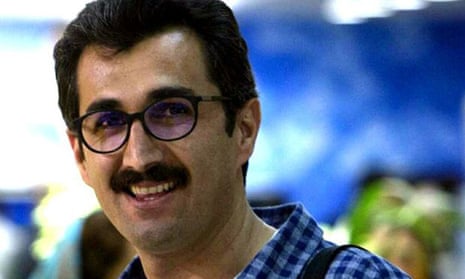Concerns are growing about the fate of an Iranian journalist, Sadra Mohaghegh, who was arrested at his house last week. It is not clear whether the authorities had a warrant for his arrest.
Mohaghegh is editor of the social affairs pages of the reformist Shargh newspaper. His arrest on 19 September was first reported by the semi-official Mehr news agency, which referred to him as a “collaborator in contact with the anti-revolutionary media outlets”. The agency illustrated its story with a graphic featuring the word “infiltration”, which has become a codeword for alleged links with the west.
Mehr’s report alleged that Mohaghegh had been arrested for “producing reports about the country’s internal issues for the anti-revolutionary media”, a reference to exiled media outlets. Iranian leaders are deeply suspicious of exiled media and have previously punished collaborators.
Mohaghegh is a well known journalist inside Iran with a track recrord of reporting environmental and social issues. He is is credited with exposing the wrongdoings of the authorities and giving voice to people in remote areas of the country.
Rouhani has faced a great deal of criticism internally about his passive response towards the continuing harassment of journalists and human rights activists.Iran’s constitution prohibits censorship but the country has one of the world’s worst records for press freedom. Dozens of newspapers have been shut down in the past decade, and last year the New York-based Committee to Protect Journalists (CPJ) said only China and Egypt had jailed more journalists.
According to the Paris-based Reporters Sans Frontières (RSF), at least 12 journalists and 14 citizen journalists and bloggers are in jail in Iran.
Last year Iran’s hardline judiciary arrested a number of journalists and businessmen after the supreme leader, Ayatollah Ali Khamenei, warned against “an infiltration” of the political system. He repeatedly made clear he felt Iran should not embrace the west after the landmark nuclear agreement announced in July. Activists say the Iranian judiciary embarked on a campaign of arbitrary arrests to provide justification for Khamenei’s remarks.
The archive of Mohaghegh’s articles on Shargh’s website shows that he travelled to France in the summer and visited the offices of Le Figaro. He filed a number of reports from Paris, including one about the climate change summit.
RSF said Mohaghegh had published several stories about a case of alleged corruption at Tehran city hall in the weeks before his arrest. It said another journalist, Yashar Soltani, the editor of Memari News, had been arrested earlier this month after reporting on the same case. Sherif Mansour, of the CPJ, said: “Whether journalists are advocating for national political reform or reporting on a local land deal, they are not safe from Iranian prisons. We call on Iranian authorities to stop arbitrarily throwing journalists in jail and let the press do its job.”
This week Iran’s president, Hassan Rouhani, complained that writers and media outlets were not telling people the truth. Arash Ashourinia, a photographer, responded on Twitter: “Where are those who said [the truth]?” adding the hashtag #SadraMohaghegh.
